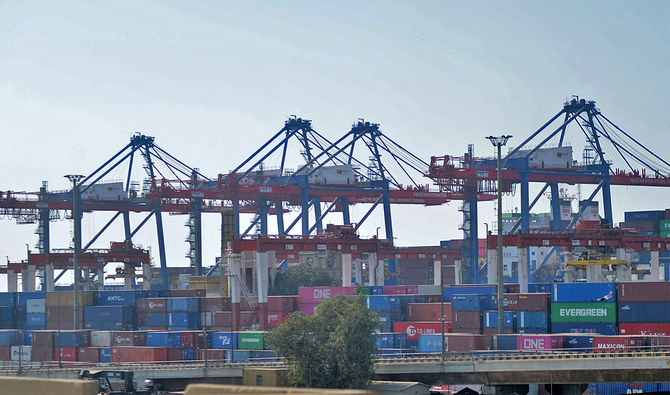KARACHI: Pakistan’s current account deficit (CAD) decreased by 86 percent to $74 million in February, hitting a two-year low due to a recent increase in remittances, import restrictions, and currency depreciation, according to official data and analysts.
The government imposed restrictions to process the import bill as it faced an extreme shortage of dollar liquidity and allowed only limited imports of goods to prevent a massive outflow of the greenback from the country.
According to the State Bank of Pakistan, the country recorded a current account deficit of $74 million last month, down 86 percent from a deficit of $519 million recorded in the same month last year.
The primary reason for the deficit’s decline was a 23.5 percent reduction in the country’s total imports on an annual basis, with total exports and remittances declining by 19 and nine percent during the same period, respectively.
During the eighth month of the current fiscal year, Pakistan’s deficit decreased by 68 percent to $3.9 billion, compared to a deficit of $12.1 billion recorded in the corresponding month last year.
“The $74 million CAD in February 2023 is the lowest monthly deficit since February 2021 due to a surge [by 4.9 percent] in the remittance inflows that supported the external position of the country,” Tahir Abbas, head of research at Arif Habib Limited, told Arab News on Tuesday.
“This is due to the continued impact of import curbs through strong administrative measures and currency depreciation,” he added. “Besides, the slowing economy is also a key reason behind the reduction in deficit.”
Pakistani banks are reportedly hesitant to open letters of credit (LCs) for goods imports, likely due to the government’s restrictive measures to prevent a significant outflow of dollars.
Pakistan’s import bill in February stood at $4.03 billion, according to the Pakistan Bureau of Statistics (PBS), down 17.25 percent from January’s $4.87 billion and 31.08 percent lower than February last year’s $5.85 billion.
Pakistan’s imports during July-February 2022-23 (FY23) totaled $40.12 billion, a 23.51 percent decrease from the corresponding period last year’s $52.45 billion.
PBS data show exports during the same period totaled $18.67 billion, a 9.21 percent decrease from last year’s $20.57 billion.
The import of oil posted a decline of 21 percent YoY in February, and the imports of mogas and high-speed diesel (HSD) decreased by 28 and 33 percent YoY, respectively, amid depressed demand.
Pakistani analysts said the import decline reflected the slowing economy, which was otherwise expected to grow by about one percent during the current fiscal year (FY23), and the depreciation of Pakistan’s national currency, which fell by more than five percent against the dollar in the last month alone.
“We expect that Pakistan’s GDP growth will remain between zero to one percent since demand remains depressed which is also reflected in the overall state of large industries that have posted negative growth,” Samiullah Tariq, research director at Pakistan-Kuwait Investment Company, told Arab News.
The import decline that improved the current account deficit is also attributed to the weakening of Pakistan’s national currency.
On Tuesday, the Pakistani rupee closed a little higher against the greenback at Rs283.92, compared to the previous closing of Rs284.03.
The stock that closed bearish on Tuesday also gained some support from the improving current account deficit number.
“Mid-session support was witnessed due to the upbeat data of $74 million current account deficit in February 2023 which fell by 68 percent on month-on-month basis,” Ahsan Mehanti, CEO of Arif Habib Corporation, said. “However, delays over IMF [International Monetary Fund] staff level agreement on bailout package, industrial closures over foreign exchange worries and political uncertainty played a catalyst role in the bearish close.”
Talks between cash-strapped Pakistan and IMF officials for the completion of the ninth review of a $7 billion bailout program have yet to be completed, despite a lapse of five months.
The completion of the review would pave the way for the disbursement of $1.2 billion from the fund, boosting the country’s foreign exchange reserves, which currently stand at $4.3 billion.
















